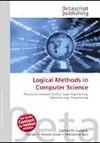随机抽取与渐近汉明距离
IF 1
4区 数学
Q4 COMPUTER SCIENCE, THEORY & METHODS
引用次数: 7
摘要
通过研究在渐近Hamming距离上接近随机的Martin-L\ ' '的序列,我们得到了梅德韦杰夫度的非隐含结果。我们的结果是,随机双免疫集合类不能被梅杰约化为具有复填充维数1的集合类。本文章由计算机程序翻译,如有差异,请以英文原文为准。
Randomness extraction and asymptotic Hamming distance
We obtain a non-implication result in the Medvedev degrees by studying
sequences that are close to Martin-L\"of random in asymptotic Hamming distance.
Our result is that the class of stochastically bi-immune sets is not Medvedev
reducible to the class of sets having complex packing dimension 1.
求助全文
通过发布文献求助,成功后即可免费获取论文全文。
去求助
来源期刊

Logical Methods in Computer Science
工程技术-计算机:理论方法
CiteScore
1.80
自引率
0.00%
发文量
105
审稿时长
6-12 weeks
期刊介绍:
Logical Methods in Computer Science is a fully refereed, open access, free, electronic journal. It welcomes papers on theoretical and practical areas in computer science involving logical methods, taken in a broad sense; some particular areas within its scope are listed below. Papers are refereed in the traditional way, with two or more referees per paper. Copyright is retained by the author.
Topics of Logical Methods in Computer Science:
Algebraic methods
Automata and logic
Automated deduction
Categorical models and logic
Coalgebraic methods
Computability and Logic
Computer-aided verification
Concurrency theory
Constraint programming
Cyber-physical systems
Database theory
Defeasible reasoning
Domain theory
Emerging topics: Computational systems in biology
Emerging topics: Quantum computation and logic
Finite model theory
Formalized mathematics
Functional programming and lambda calculus
Inductive logic and learning
Interactive proof checking
Logic and algorithms
Logic and complexity
Logic and games
Logic and probability
Logic for knowledge representation
Logic programming
Logics of programs
Modal and temporal logics
Program analysis and type checking
Program development and specification
Proof complexity
Real time and hybrid systems
Reasoning about actions and planning
Satisfiability
Security
Semantics of programming languages
Term rewriting and equational logic
Type theory and constructive mathematics.
 求助内容:
求助内容: 应助结果提醒方式:
应助结果提醒方式:


